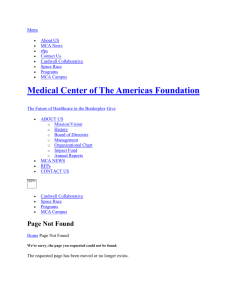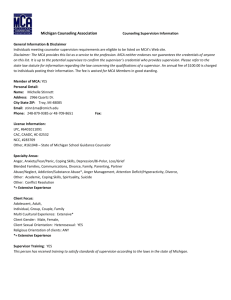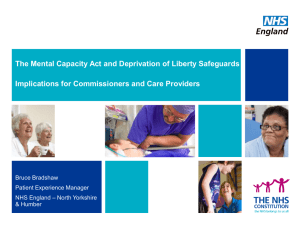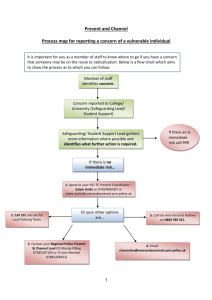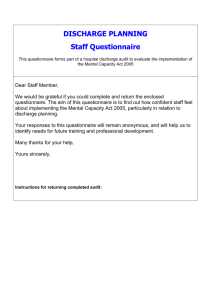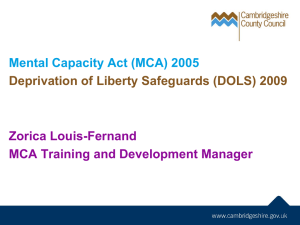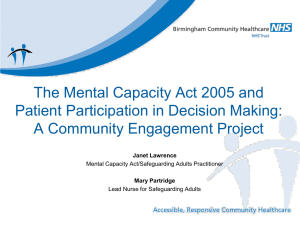PRACTITIONERS FORUM * MENTAL CAPACITY ACT
advertisement
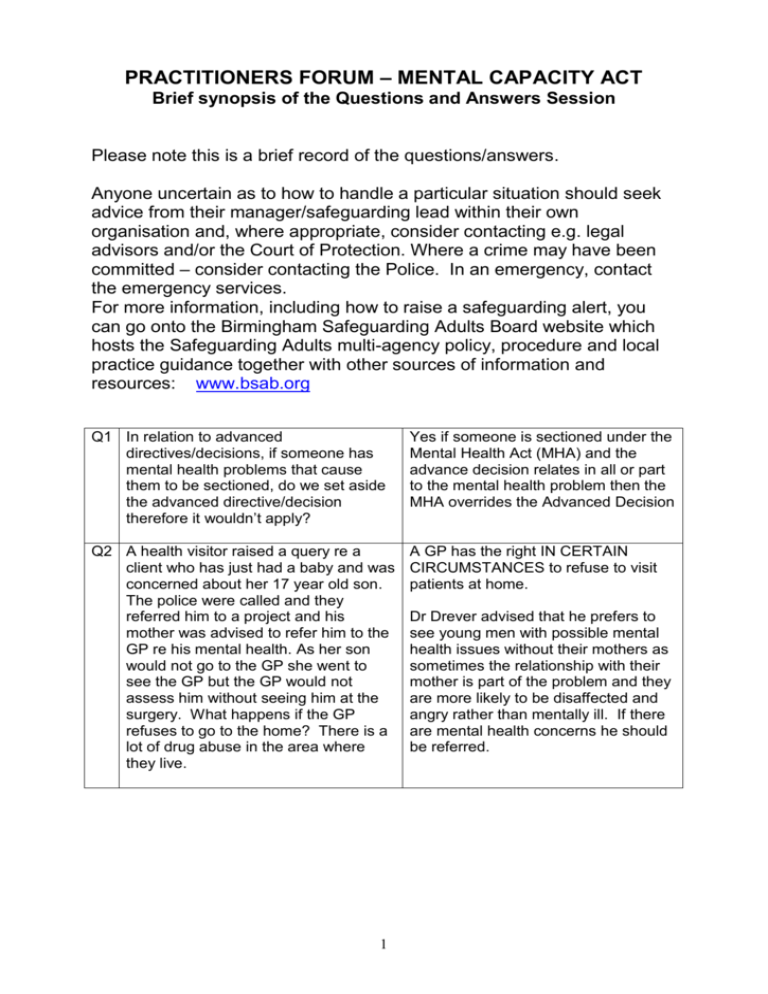
PRACTITIONERS FORUM – MENTAL CAPACITY ACT Brief synopsis of the Questions and Answers Session Please note this is a brief record of the questions/answers. Anyone uncertain as to how to handle a particular situation should seek advice from their manager/safeguarding lead within their own organisation and, where appropriate, consider contacting e.g. legal advisors and/or the Court of Protection. Where a crime may have been committed – consider contacting the Police. In an emergency, contact the emergency services. For more information, including how to raise a safeguarding alert, you can go onto the Birmingham Safeguarding Adults Board website which hosts the Safeguarding Adults multi-agency policy, procedure and local practice guidance together with other sources of information and resources: www.bsab.org Q1 In relation to advanced directives/decisions, if someone has mental health problems that cause them to be sectioned, do we set aside the advanced directive/decision therefore it wouldn’t apply? Yes if someone is sectioned under the Mental Health Act (MHA) and the advance decision relates in all or part to the mental health problem then the MHA overrides the Advanced Decision Q2 A health visitor raised a query re a client who has just had a baby and was concerned about her 17 year old son. The police were called and they referred him to a project and his mother was advised to refer him to the GP re his mental health. As her son would not go to the GP she went to see the GP but the GP would not assess him without seeing him at the surgery. What happens if the GP refuses to go to the home? There is a lot of drug abuse in the area where they live. A GP has the right IN CERTAIN CIRCUMSTANCES to refuse to visit patients at home. 1 Dr Drever advised that he prefers to see young men with possible mental health issues without their mothers as sometimes the relationship with their mother is part of the problem and they are more likely to be disaffected and angry rather than mentally ill. If there are mental health concerns he should be referred. Q3 A dietician working in the community raised an issue about the dilemma of when to feed or not to feed nasal gastrically. There have been two incidents, one patient with a nasal bridal loop and another patient who was discharged with mittens. Do I need to complete a DoLS assessment? Both patients have now been discharged from hospital. The DoLS process does not apply to people living in their own home, only to those in a hospital or care home setting. You should ensure you act in line with the MCA and the principles in the Act: assess and record capacity, then act in best interests if patient does not have capacity. Record how you have reached your decision. Consider any relevant guidance and work in line with organisational policy. Your organisation should have a policy and capacity tools/paperwork you can access. You need to speak to someone in your organisation for advice/information.: The A2 SCR had a recommendation around supervision and the questioner was asked about their own line manager and teams etc as source of support/information. Q4 A Clinical Case Manager asked a question in relation to a patient who has been assessed and deemed to have capacity but tends to refuse care. He has family/carers and they will also look after his money. He had about £4k saved for his funeral but when he received his statement it seemed quite a lot of money is missing. The police were involved and a social worker went out to assess him and he was deemed to have capacity. The patient did not want to press charges against his children so the questioner asked what they could do in such circumstances. If the person has been assessed to have capacity in relation to financial decisions then under the MCA he has the right to make an unwise decision Consider if the capacity assessment was sufficiently detailed to demonstrate his understanding, retention, weighing up and that he had been able to feed back his decision. Finally even if the person does not agree to any action been taken, the police can still pursue the issue which could in turn lead to a prosecution. It’s important to recognise that the MCA is not a tool to be used by us as professionals to get our own way. If someone has capacity they have the right to make what we might think are unwise decisions. In these circumstances, as professionals we have to show we have tried to support patient, discussed implications of their choices, explored alternatives, worked with other agencies toward a solution, but ultimately it may be patient choice. Issue of inherent jurisdiction was raised by audience member and possibility of action being taken even where an adult at risk does not want to make a complaint. Panel agreed that where very serious concerns are apparent this may be an option. Seeking legal advice should be considered. 2 Q5 My background is in mental health. What would happen in a court of law if something were to happen to that person (see question 4 above) because they have been deemed to have had capacity? Audience comment: we must not forget the issue of coercion. Being unduly influenced to make a decision. Q6 A social worker in a mental health team commented that through their work they have been involved with a service user and have noticed a difference in attitude from the police. This person is being financially abused by their friend which is a long term situation. By working with the police they have now encouraged this person to make a statement. I have found the police very helpful in this case. This is good to know. Serious Case Reviews by their nature focus on times when things have gone wrong. But there are more often times when we work together successfully as agencies. Q7 A community psychiatric nurse commented, I was wondering who actually holds the MCA capacity assessment once the decision has been made, how long does a capacity assessment last for? Some clients are very plausible so would agree for a week but would then revert. Am I to constantly make a mental capacity assessment? I am concerned that if this case went to court they would ask where the Mental Capacity Assessment was. It is the decision maker who has responsibility for assessing and acting in best interests. If the issue is around non concordance, as practitioners frequently encounter in mental health, then the person may lack the mental capacity due to lack of insight into their condition to agree to all or part of their treatment. Then practitioners can proceed to give medication in their best interests and this is documented in their care plan . The MCA allows for some treatment of mental disorder where a person does not meet the criteria for the MHA or are not subject to supervised / aftercare under 117 which can involve treatment. Where the persons condition changes then a reassessment will be required. Panel added: this is about professional accountability. Considering a range of options, and multi-agency working: share perspectives, share the risk, demonstrate collectively that we have thought through the issues and tried to find a way forward. Pointed to the recent guidance from BSAB about self-neglect and failure to engage with services which is helpful. Capacity often fluctuates. Professionals should continually be assessing and looking at the decision to see if that person has the capacity to be making that decision. This reinforces that the MCA has to be part of our everyday practice, fundamental to how we work, not a standalone thing. 3 Q8 There isn’t anything in the Act that tells you to make sure they are taking their medication. Statement from a member of the audience. Q9 This was a reminder re using the Office of Public Guardian. Lasting Power of Attorney can be put in place by an individual whilst they have mental capacity to support decision making if they should lose it. My understanding is that the Court of Protection (COP) can make a decision regarding someone’s deprivation and so on at home. The helpline for the COP is open 24/7. They can make a decision over the phone. An interim decision can save money and litigation. Panel reinforced that Court of Protection is an option but as a general point, staff should in the first instance seek advice within their own organisation, including legal advice if required. 4

